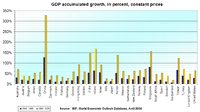
Photo from wikipedia
Abstract Arsenic pollution and climate change are two major global challenges that have threatened the aquatic environment and to a certain extent have led to extinction of aquatic animals. Concerted… Click to show full abstract
Abstract Arsenic pollution and climate change are two major global challenges that have threatened the aquatic environment and to a certain extent have led to extinction of aquatic animals. Concerted and accelerated scientific efforts are in progress to restrict the ill- impacts of pollution and climate change in the aquatic ecosystem. In this context, we have conducted a study to delineate the effect of omega-3 fatty acids i.e., eicosapentaenoic acid (EPA) and docosahexaenoic acid (DHA) in mitigating arsenic pollution and temperature stress in Pangasianodon hypophthalmus. Four isocaloric and iso‑nitrogenous diets were prepared viz. control feed (no supplementation), and three treatment groups with combined level of EPA + DHA at 0.2, 0.4 and 0.6%. Fish were reared under arsenic (2.65 mg L−1) and elevated temperature (34 °C) (As+T) stress for 105 days with eight different treatment groups in triplicates. Growth performance, oxidative stress enzymes, stress biomarkers, immunity, lipid profile, bioaccumulation of the arsenic in fish tissues and bacterial infection in terms of cumulative mortality and relative percent survival were altered on exposure of arsenic and temperature stress. Supplementation of combinatorial mixture of EPA + DHA at the rate of 0.2 and 0.4% in the diet led to improved growth performance, anti-oxidative status, immunity of the fish and reduced the infection against Aeromonas hydrophila. Neurotransmitter enzyme, HSP 70 and Vitamin C were significantly enhanced (p
Journal Title: Aquaculture
Year Published: 2022
Link to full text (if available)
Share on Social Media: Sign Up to like & get
recommendations!